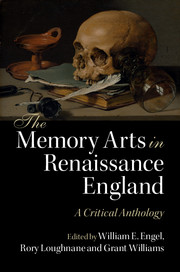Book contents
- Frontmatter
- Dedication
- Contents
- List of figures
- Acknowledgements
- A note on abbreviations
- Introduction
- PART I The art of memory
- PART II Rhetoric and poetics
- PART III Education and science
- PART IV History and philosophy
- PART V Religion and devotion
- PART VI Literature
- Introduction to Part VI
- POETRY
- VI.1 John Skelton, ‘Upon a Dead Man's Head’ (1527)
- VI.2 Edmund Spenser, The Faerie Queene (1590)
- VI.3 Anthony Sherley, Wit's New Dial (1604)
- VI.4 Richard Niccols, Mirror for Magistrates (1610)
- VI.5 Abraham Holland, ‘A Funeral Elegy’ (1626)
- VI.6 George Herbert, The Temple (1633)
- VI.7 Francis Quarles, Emblems (1635)
- VI.8 Mary Fage, Fame's Rule (1637)
- VI.9 Margaret Cavendish, selected works
- VI.10 John Milton, Paradise Lost (1674)
- PLAYS AND PROSE
- Index
- References
VI.10 - John Milton, Paradise Lost (1674)
from POETRY
Published online by Cambridge University Press: 05 August 2016
- Frontmatter
- Dedication
- Contents
- List of figures
- Acknowledgements
- A note on abbreviations
- Introduction
- PART I The art of memory
- PART II Rhetoric and poetics
- PART III Education and science
- PART IV History and philosophy
- PART V Religion and devotion
- PART VI Literature
- Introduction to Part VI
- POETRY
- VI.1 John Skelton, ‘Upon a Dead Man's Head’ (1527)
- VI.2 Edmund Spenser, The Faerie Queene (1590)
- VI.3 Anthony Sherley, Wit's New Dial (1604)
- VI.4 Richard Niccols, Mirror for Magistrates (1610)
- VI.5 Abraham Holland, ‘A Funeral Elegy’ (1626)
- VI.6 George Herbert, The Temple (1633)
- VI.7 Francis Quarles, Emblems (1635)
- VI.8 Mary Fage, Fame's Rule (1637)
- VI.9 Margaret Cavendish, selected works
- VI.10 John Milton, Paradise Lost (1674)
- PLAYS AND PROSE
- Index
- References
Summary
About the author
John Milton (1608–74), ‘secretary for foreign tongues’ during the Interregnum, displayed fluency in Latin, Greek, Hebrew, French and Italian. With the Restoration of Charles II, he was arrested and his books publicly burned. He managed to complete Paradise Lost even though by 1652 he was permanently blind.
About the text
Milton's second edition of Paradise Lost (1674), reconfigured from a ten- to twelve-book format, aims to ‘assert Eternal Providence, / And justify the ways of God to men’ (I, 25–6); to show how and why man's fall, death and salvation are all acts of a just God. This is accomplished by retracing the events conducing to and following the fall in a carefully arranged non-chronological episodic structure, including a panoramic vision of human history, while promoting a view of free will such that God's foreknowledge does not predestine the outcome.
The arts of memory
Consistent with his early reading of Cicero and Quintilian, and exemplified through documented feats of composition and recitation at Cambridge, Milton was steeped in the classical texts on rhetoric and the memory arts. Further, insofar as the final version of the poem was composed while he was blind, Paradise Lost is concerned with memory both in its creation and subject matter. It is a narrative of recollection, designed to trigger and augment the truths of his readers’ faith. The epic is a well-stocked repository of scriptural passages and Protestant interpretations, as well as all manner of cultural memories but especially those regarding one's place in the grand scheme as being in medias res, already in the middle of things. The first of the three linked excerpts (II, 737–67) concerns Satan's encounter with Sin as he sets out on his seemingly heroic quest, when he is reacquainted with Sin, who had sprung from his own mind and body, and thus is both his daughter and lover on whom he sired Death (an inversion of the Holy Trinity). The grotesque imagery and iconographic liberties deployed in this passage, reminiscent of the conventions for stocking a memory theatre, activate the reader's imagination regarding the origins and effects of sin and death.
- Type
- Chapter
- Information
- The Memory Arts in Renaissance EnglandA Critical Anthology, pp. 316 - 320Publisher: Cambridge University PressPrint publication year: 2016



